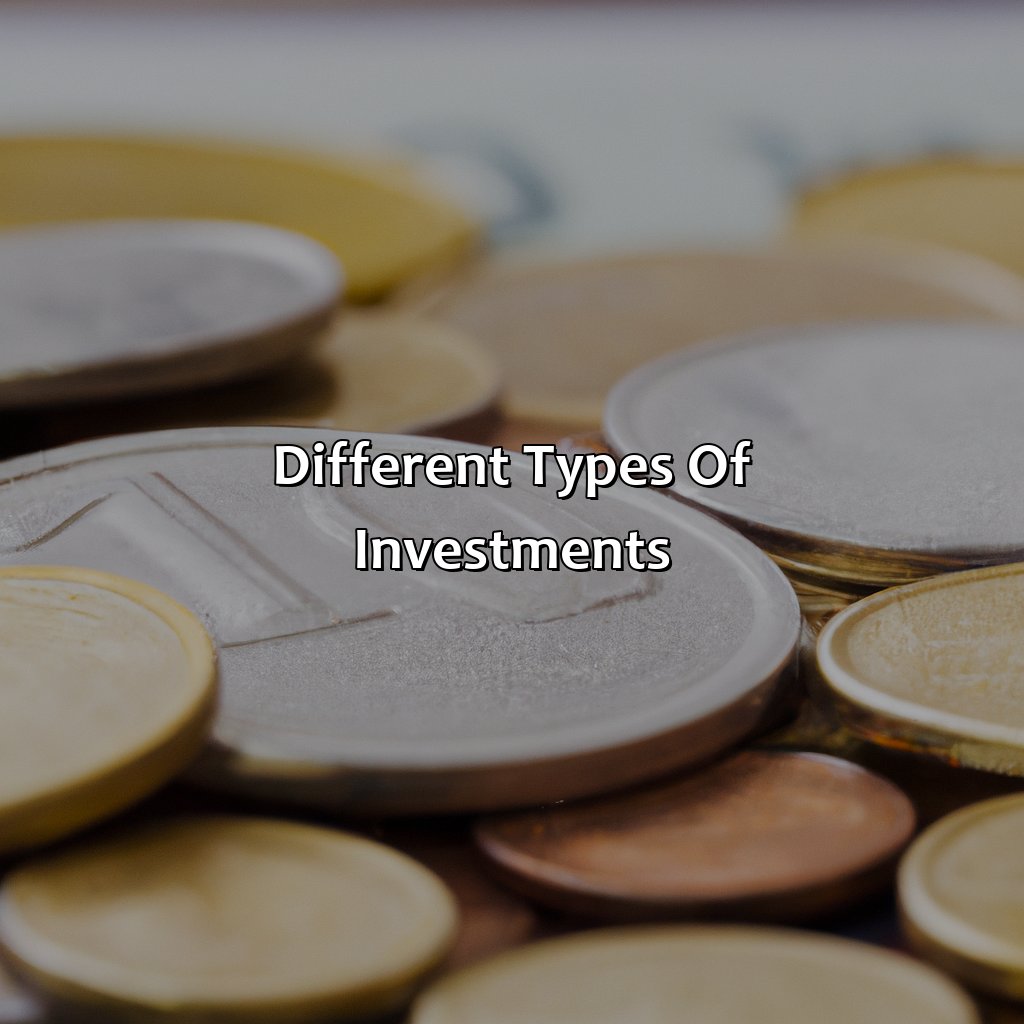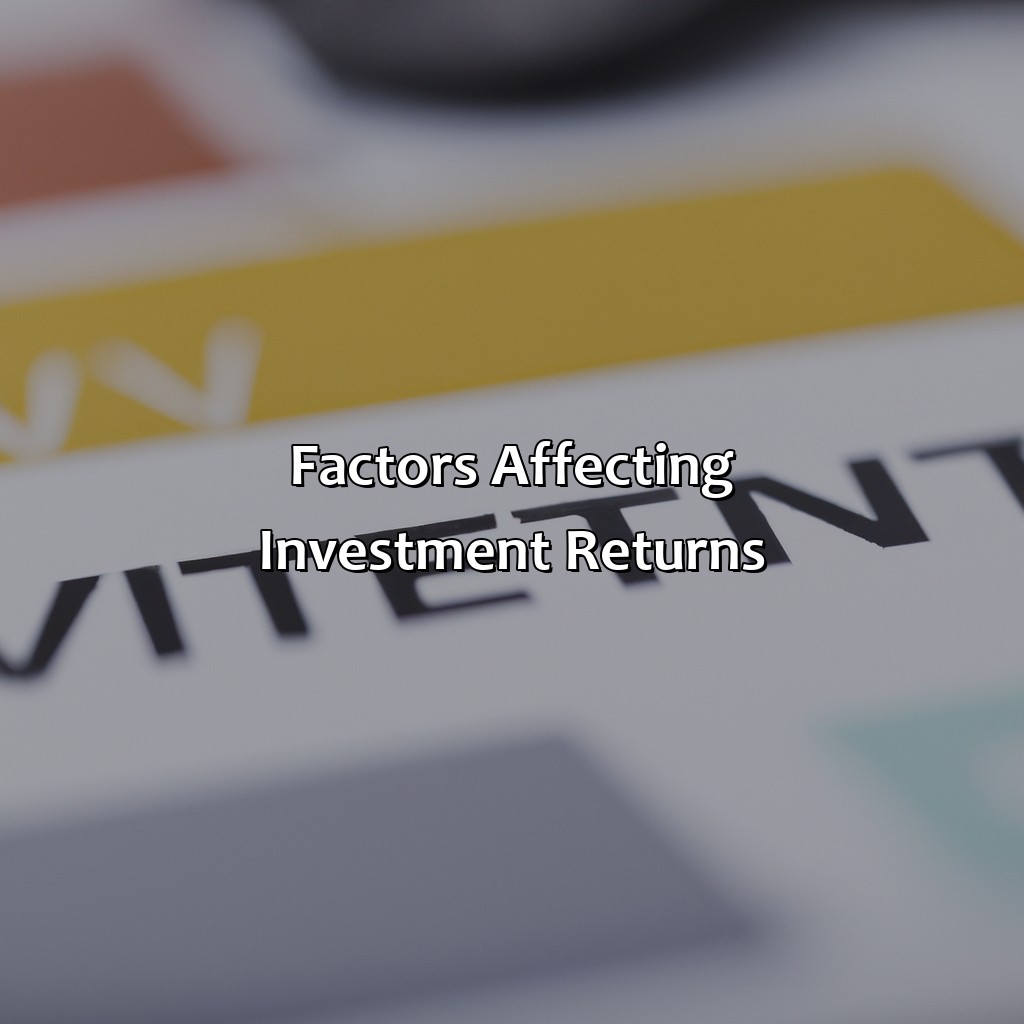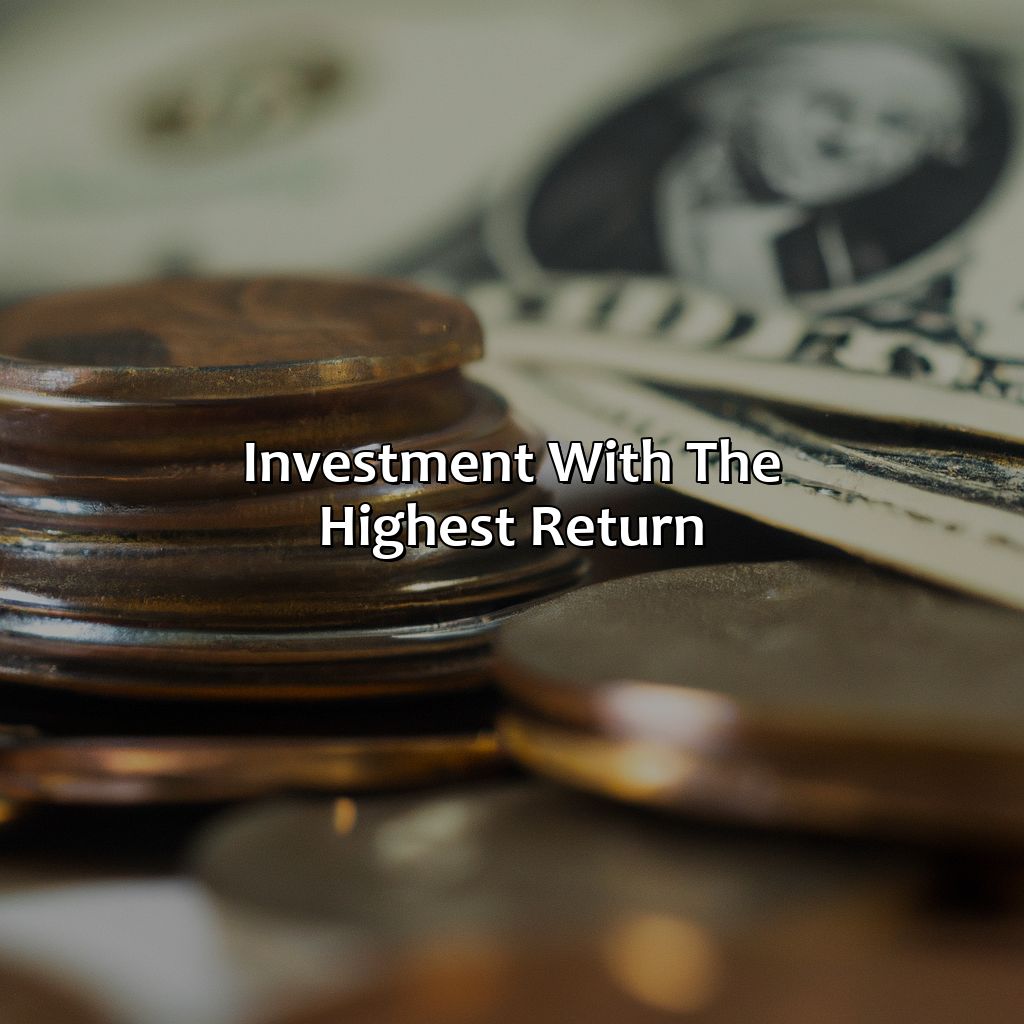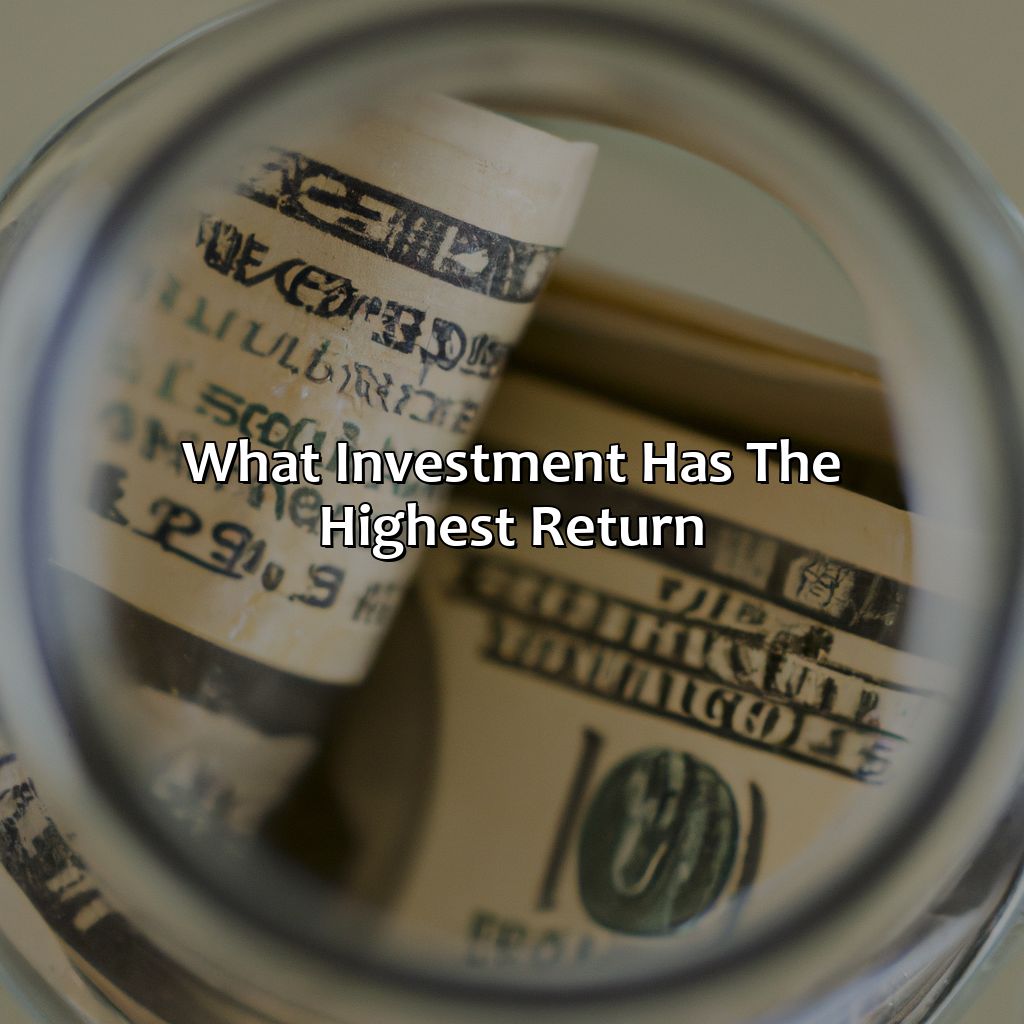What Investment Has The Highest Return?
Key Takeaway:
- Different types of investments have varying levels of risk and returns: Stocks, bonds, real estate and cryptocurrency are popular types of investments with varying returns. Investors should carefully consider the risks and potential returns of each type before investing.
- Factors affecting investment returns include risk, timeframe and fees: The level of risk an investor is willing to take on, the length of time an investment is held, and the fees associated with the investment can all impact the potential return. It is important to consider each of these factors when making investment decisions.
- Historically, stocks have provided the highest returns: While stocks have more risk than some other types of investments, historical data shows that they have provided the highest returns over the long term. However, it is important to remember that past performance does not guarantee future results.
Are you looking for the best way to invest your money and get the highest return? This article will explore different investment options and explain which offer the biggest returns. You’ll learn the best options for maximizing your investments.
Different types of investments
Investing your money can help grow your wealth and secure your financial future. Finding the right investment options can be daunting, as there are different types of investments that can provide varying returns. Here are some options to consider:
- Stocks: Investing in stocks can provide high potential returns, but also comes with high risks.
- Bonds: Bonds offer regular interest payments and lower risks compared to stocks.
- Real Estate: Investing in real estate allows for potential rental income and property appreciation, but requires significant upfront capital and maintenance costs.
- Mutual Funds: Mutual funds pool money from various investors to invest in a variety of stocks, bonds, and other assets.
- ETFs: ETFs are like mutual funds, but are traded on stock exchanges and offer lower fees and potential returns.
- Cryptocurrencies: Cryptocurrencies, like Bitcoin, can offer high returns but are considered highly volatile and risky investments.
It is important to consider factors such as your financial goals, risk tolerance, and investment horizon when choosing which type of investment is right for you.
Unique details to consider include the tax implications of investments and the diversification of your portfolio to minimize risk.
In a true story, in the 1990s, the dot-com bubble occurred where many people invested in tech companies at high valuations, only for the bubble to burst, causing significant losses for investors. This highlights the importance of conducting thorough research and being cautious when investing.

Image credits: retiregenz.com by David Arnold
Factors affecting Investment Returns
Investment strategies are influenced by a variety of factors which can positively or negatively impact returns. Understanding these factors can help investors make informed decisions about where to allocate their resources. Below is a summary of these factors and how they affect investments.
| Factor | Description | Impact |
| Economic Conditions | The state of the economy, including inflation rates and interest rates. | Highly influential, with a positive or negative impact depending on the economy’s direction. |
| Asset Allocation | The distribution of investments across various types of assets. | Strongly impacts returns, with a balanced and diversified portfolio generally performing best. |
| Risk Tolerance | The degree of comfort an investor has with taking on risk. | Higher risk investments have the potential for higher returns, but can also lead to greater losses. |
| Investment Horizon | The length of time an investor plans to hold onto an investment. | Longer investment horizons generally result in higher returns. |
It’s important to note that there are unique details that can impact investment returns, such as geopolitical events, company-specific news, and technological advancements. While these factors may not have a direct impact on investment strategies, they can still significantly influence returns.
One true story that illustrates this point is the 2016 US Presidential Election. After the election, the stock market experienced an immediate surge, with industries such as banking and healthcare seeing significant gains. It’s an example of how unexpected events can impact investments, and how being aware of current events is crucial for making informed decisions.

Image credits: retiregenz.com by Joel Woodhock
Investment with the highest return
The search for the most profitable investment has always been a priority for investors worldwide. Identifying the best option for an investment with high returns is a complex task that requires careful analysis. While evaluating the investment options, the risk factor also needs to be assessed. It is essential to note that the riskier the investment, the higher the returns. Hence, the best investment with the highest return is subjective, depending on the investor’s risk profile.
Investors looking to maximize their returns typically opt for stocks, bonds, and property investment. Stocks and bonds offer high returns in the long run, but their value may greatly fluctuate. On the other hand, property investment provides a dependable income stream and benefits from capital appreciation. Real estate investment trusts (REITs) present an excellent option for investors looking for a passive income source with significant returns.
Diversification is key to successful investing, and experts suggest investing in a mix of assets based on personal preference, risk tolerance and financial goals. A balanced portfolio comprising different investments reduces the overall risk and helps maximize returns. Historical data suggest that equity funds have returned significantly higher returns than bonds in the long run. However, past performance is not an indicator of future returns. Investors should look for assets with the potential of growth and scope for sustained returns.
In 1980, oil and gas drilling companies started offering investors a chance to invest in ‘limited partnerships’ to raise capital for their drilling operations. Investors poured money into this highly profitable investment option, which was later revealed to be fraudulent, resulting in substantial loss for investors. This event highlights the importance of conducting thorough research and due diligence before investing in any asset.

Image credits: retiregenz.com by Harry Woodhock
Five Facts About Investments With the Highest Returns:
- ✅ Historically, stocks have provided the highest returns of any investment, averaging about 10% annually over the long term. (Source: The Balance)
- ✅ Real estate investments can provide high returns, with an average annual return of 8.6% over the past 10 years. (Source: Investopedia)
- ✅ Peer-to-peer lending platforms, like Lending Club and Prosper, have average returns of around 5-8% annually. (Source: NerdWallet)
- ✅ High-yield savings accounts and CDs offer low risk and moderate returns, with rates ranging from 1-2% annually. (Source: Bankrate)
- ✅ Cryptocurrencies, like Bitcoin, offer the potential for high returns, but also come with high volatility and risk. (Source: Forbes)
FAQs about What Investment Has The Highest Return?
What investment has the highest return?
While there is no single investment that can guarantee the highest return, historically, the stock market has provided the highest average return over the long term. However, bear in mind that investing always carries risks.
Are there any high-return investments that are low-risk?
No investment can guarantee high returns and low risk simultaneously. Higher returns are typically associated with higher risk. However, diversification across different asset classes can help lower overall portfolio risk.
What are some examples of high-return investments?
Examples of high-return investments include stocks, mutual funds, real estate, and alternative investments such as venture capital or private equity. However, returns can vary widely depending on market conditions and individual investment choices. Investing in stocks carries a risk of significant loss and is not suitable for all investors.
Can I achieve high returns without taking on a lot of risk?
No, higher returns are typically associated with higher risk. However, by diversifying across different asset classes and maintaining a long-term investment horizon, you can potentially lower overall portfolio risk while still achieving higher returns over time.
What factors should I consider when evaluating investment returns?
When evaluating investment returns, consider the investment’s historical performance, fees and expenses, risks, liquidity, and your own investment goals and risk tolerance. Higher risk investments may offer higher returns over the long term, but may also experience more volatility, which may not be suitable for all investors.
Is it possible to earn high returns without having to invest a large sum of money?
Yes, it is possible to earn high returns even with a smaller investment. Regular investments over time, known as dollar-cost averaging, can help to smooth out market volatility and build wealth over the long term. Additionally, some alternative investments such as crowdfunding platforms offer lower minimum investment amounts.


